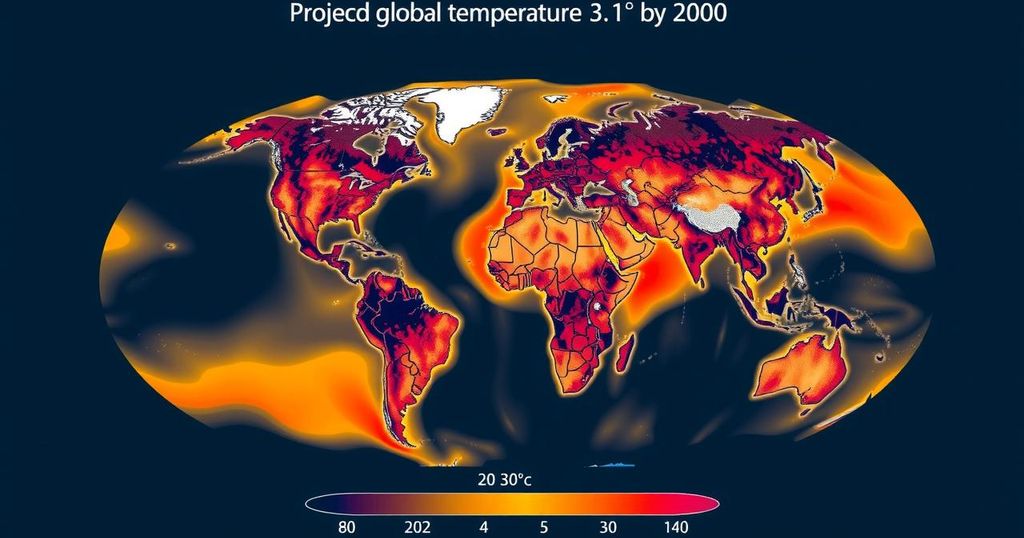UN Report Forecasts Alarming 3.1°C Temperature Rise by 2100
The UN’s latest report warns of a potential 3.1°C rise in global temperatures by 2100 unless countries commit to substantial reductions in greenhouse gas emissions. With current trajectories indicating a failure to meet the Paris Agreement’s 1.5°C goal, the urgency for enhanced national commitments and global cooperation is more pressing than ever. It outlines the necessary actions needed over the next decade to avert catastrophic climate change. Notably, the report focuses on the role of existing technologies in achieving these goals, contingent upon unprecedented international collaboration.
A recent United Nations report has issued a dire warning that, without substantial reductions in greenhouse gas emissions, the world is on track for a shocking 3.1°C rise in average global temperatures by 2100. The findings underscore the ramifications of failing to meet the 1.5°C global warming threshold established during the Paris Agreement in 2015. Throughout the years, despite international pledges, nations have largely continued with practices that exacerbate climate change, prioritizing military and fossil fuel investments over sustainable practices. The report, released on October 24, 2024, emphasizes the urgent need for countries to enhance their nationally determined contributions (NDCs)—specific commitments to limit emissions. It asserts that current trajectories must change significantly, with a necessary reduction of 42% in emissions by 2030 and 57% by 2035. UN officials, including Inger Andersen, the director of the UN Environment Program, stress that “Climate crunch time is here,” calling for unprecedented global mobilization to avert imminent climate catastrophe. Furthermore, the UN Secretary-General António Guterres highlighted the critical link between rising emissions and increased occurrences of severe climate events, warning that failure to bridge the emissions gap could plunge the world into a climate disaster. The upcoming COP29 meeting is expected to focus on innovative national action plans aligned with ambitious emissions targets. Despite the ongoing challenges, there is a glimmer of hope, as technologies capable of significant emissions reduction are available, yet their potential hinges on a coordinated global effort. The report concludes with a stark reminder: without extraordinary commitment and cooperation, the desired climate goals will remain unattainable, propelling humanity toward an impending crisis.
The context of this UN report lies in the growing urgency to combat climate change amidst rising global temperatures and extreme weather events. The Paris Agreement set ambitious targets to limit temperature rises to well below 2°C, ideally 1.5°C, primarily through international cooperation and significant emission reductions. The report reflects an ongoing struggle to implement robust climate action and outlines necessary steps that nations must take. Historical trends indicate a troubling pattern of underachievement regarding environmental commitments, which has led to increased greenhouse gas emissions. Additionally, the scientific consensus emphasizes the critical impacts of climate change on global ecosystems, weather patterns, and human societies. As communities worldwide face dire environmental challenges—such as flooding in typically dry areas, catastrophic storms, and rising sea levels—the report serves as both a wake-up call and an outline for how to avert future crises through immediate and concerted action. The report’s findings come in the wake of multiple global climate conferences, reflecting empty promises if significant changes are not made based on data and expert recommendations. Enhanced commitments from nations, especially those responsible for the largest emissions, remain crucial for any hope of achieving the Paris Agreement’s objectives.
In conclusion, the UN’s recent report presents an alarming forecast of a potential 3.1°C rise in global temperatures by 2100 if nations fail to substantially diminish emissions. It underscores the crucial importance of enhancing commitments under the Paris Agreement and highlights the severe consequences of inaction. With current policies placing the world at risk of catastrophic climate impacts, it is imperative that international cooperation is not only renewed but escalated to effectively confront the climate crisis. The report calls for immediate and bold initiatives to embrace technologies that can lead to meaningful reductions in greenhouse gas emissions, emphasizing that the time for action is now.
Original Source: cleantechnica.com




Post Comment